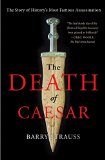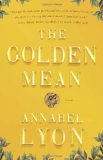Summary | Excerpt | Reviews | Beyond the book | Read-Alikes | Genres & Themes | Author Bio

A Novel of Ancient Rome
by Robert HarrisRobert Harris's first three books were all set in the
20th century. For his fourth book he broke his own mold by taking readers
back in time to the eruption of Vesuvius in the extremely enjoyable
Pompeii; and it appears that he's planning to stay in the Roman Empire for sometime to come, as Imperium is the first volume of a projected trilogy that will span the last 25 years of the Roman republic. Imperium is narrated by the elderly Tiro (103 - 4 BC) formerly
slave/secretary to the famous orator, statesman and political theorist Marcus
Tullius Cicero (106-43 BC) - an
inspired touch as not only did Tiro exist, he was also the inventor of shorthand, a system he invented (or at least refined) in order to record Cicero's speeches verbatim, and
there is evidence that he did actually write a biography of Cicero (which was
sadly lost sometime in the Middle Ages).
We first meet Cicero as a hugely ambitious lawyer in his mid-thirties, hampered
by a lack of influential contacts and money. To gain entry to the Roman
Senate it was necessary to be at least 31 years old and to be a millionaire - how little things change! In Cicero's case he has to show the
authorities that his assets total at least 1 million sesterces before he can
enter an election bid. Short term money problems are relatively easily solved by
marrying a wealthy but acerbic woman; influential friends to sponsor him are more
difficult to come by as such
friends expect favors in return, and Cicero is,
apparently, a man of deeply held principles.
The first half of the book is taken up with Cicero's prosecution of the former
governor of Sicily, Gaius Verres, a truly nasty piece of work whose gross
injustices against the people of Sicily still make the blood boil
two-thousand years after the fact; the second half is taken up with Cicero's
political battles to get himself elected. Both are grippingly brought to life
with wonderful human touches such as the great military leader, but oratorical
klutz, Pompey stumbling through his first Senate speech with a a "bluffer's
guide to procedure written out for him by the famous scholar Varro".
In his author's note, Harris addresses the issue of where fact ends and fiction
begins saying, "The majority of
the events describes did actually happen; the remainder at least could
have happened, and nothing, I hope demonstrably did not happen."
Indeed, there is no need for Harris to invent much in the life of Cicero,
considering that historians say that we know more about Cicero than we do about
any other Roman. Not only do we have 58 of the 106 speeches he delivered
but in the 14th century a cache of more than 900 letters were discovered - more
than 800 written by Cicero, and about 100 written to him - these are considered
to be particularly revealing of the man himself, as most were not written for
publication. These speeches, letters, and various other works can be found in 29
volumes as part of the
Loeb
Classical Library.
More about Cicero at BookBrowse.
Did you know?
![]() This review was originally published in The BookBrowse Review in October 2006, and has been updated for the
August 2007 edition.
Click here to go to this issue.
This review was originally published in The BookBrowse Review in October 2006, and has been updated for the
August 2007 edition.
Click here to go to this issue.

If you liked Imperium, try these:

by Barry Strauss
Published 2016
The exciting, dramatic story of one of history's most famous events—the death of Julius Caesar—now placed in full context of Rome's civil wars by eminent historian Barry Strauss.

by Annabel Lyon
Published 2011
A startlingly original first novel by "this generation's answer to Alice Munro" (The Vancouver Sun) - a bold reimagining of one of history's most intriguing relationships: between legendary philosopher Aristotle and his most famous pupil, the young Alexander the Great.
Your guide toexceptional books
BookBrowse seeks out and recommends the best in contemporary fiction and nonfiction—books that not only engage and entertain but also deepen our understanding of ourselves and the world around us.